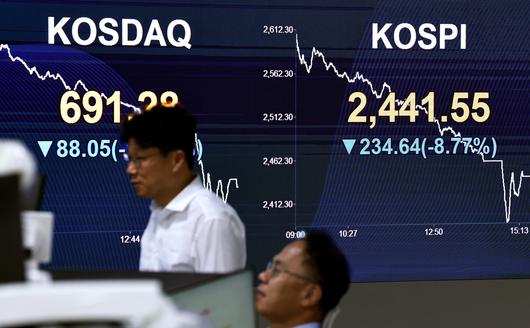 |
Since the Black Monday crash on Aug. 5, when the KOSPI and KOSDAQ plunged over 8%, the South Korean stock market has remained stagnant. Experts urge swift delisting of zombie companies and reform of practices that sacrifice minority shareholders. /News1 |
<이미지를 클릭하시면 크게 보실 수 있습니다> |
Recent data reveals that companies listed on South Korea’s stock exchange through spin-off listings now account for 18.4% of the market’s total capitalization. Spin-off listings, which result in duplicate stock entries for subsidiaries, have faced widespread criticism for diluting shareholder value—a practice viewed as taboo in most advanced economies. South Korea’s proportion of such listings far exceeds that of other major markets, standing at 52 times higher than the United States’ 0.35% and significantly outpacing Japan’s 4.3% and China’s 1.98%.
In the early 2000s, the ratio of subsidiary initial public offerings (IPOs) in South Korea was just over 4%. However, aggressive spin-offs by major corporations to raise capital have quadrupled that figure over the past two decades. Notable examples include LG Chem spinning off LG Energy Solution, Kakao forming KakaoBank, and SK Innovation separating SK IE Technology. Critics argue these moves have exacerbated the persistent undervaluation of South Korea’s stock market, often referred to as the “Korea Discount.”
While listed companies in advanced economies are generally regarded as stable and well-vetted, nearly 40% of South Korean listed firms are classified as “zombie companies,” meaning their operating profits fail to cover interest payments. Furthermore, 51% of South Korean listed companies have a price-to-book ratio (PBR) below 1, signifying that their stock prices are lower than their asset values—a stark contrast to the average PBR of 3.2 in advanced markets. The prolonged presence of unprofitable firms on the stock exchange perpetuates the undervaluation of South Korea’s market.
Despite its economy being roughly one-fifteenth the size of the United States, South Korea boasts about 2,600 listed companies, compared to 5,500 in the U.S. At Nasdaq, stocks trading below $1 for over a month are flagged and delisted if their prices fail to rebound. In South Korea, however, regulatory loopholes allow struggling firms to remain listed for more than four years, even after meeting delisting criteria.
This trend has sparked a growing consensus among investors, often summarized by the saying, “Leaving the South Korean stock market is a sign of intelligence.” Experts stress that meaningful reforms are urgently needed to restore confidence in the market. Key recommendations include swiftly delisting underperforming companies, imposing stricter restrictions on spin-offs, and enhancing shareholder returns. Additionally, overhauling outdated stock market regulations and practices to align with global standards is deemed essential for revitalizing South Korea’s financial markets.
[The Chosunilbo]
- Copyrights ⓒ 조선일보 & chosun.com, 무단 전재 및 재배포 금지 -
이 기사의 카테고리는 언론사의 분류를 따릅니다.
기사가 속한 카테고리는 언론사가 분류합니다.
언론사는 한 기사를 두 개 이상의 카테고리로 분류할 수 있습니다.
언론사는 한 기사를 두 개 이상의 카테고리로 분류할 수 있습니다.


